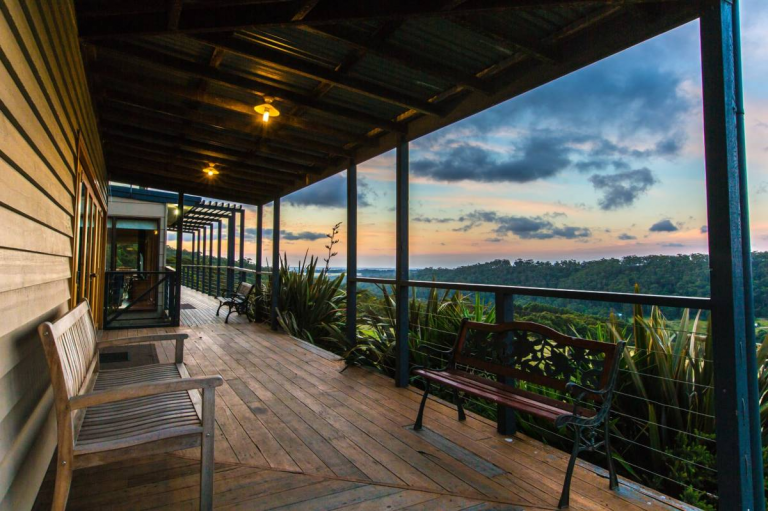The 2019 Spiritual Ecology Leadership Program started off with a four-day retreat in the beautiful King Parrot resort in the Otways from 14 - 17 February 2019. Kirsty Argento, Elise Collins and Gabriella Astiti were part of the culturally-diverse group that took part. They shared their experiences with Parveen Muhammed.
What is spiritual ecology?
‘Spiritual ecology is rooted in reverence to nature. It aligns with the core practices of IofC of introspection and serving the world through action,’ explained Argento, an Italian-Australian woman from country Victoria. What spiritual ecology has in common with IofC, she elaborated, is the underlying principle that people should listen to their ‘inner voice’ and understand their relationship with nature: it is when the spiritual connection with nature is lost that environmental destruction happens.
The current Spiritual Ecology Leadership Program, jointly run by IofC and the CERES Environmental Park in Melbourne, brings together people of different faiths and spiritual background but who have a common motivation of caring for the environment. The program is about empowering leadership, developing a spiritual response to the current environmental issues and encouraging people to take action.
Welcoming and connecting

‘The first day started with a beautiful welcome to the country, a smoking ceremony, which set the tone for the whole weekend of being one with nature,” recalled Collins, an Australian woman who lived in Pune, India, for several years. The ceremony was led by one of five Australian Indigenous families of the area.
Participants experienced the welcome in the context of the land they were standing on, and learned about how the land has responded to the changes that have happened around it and to it. The welcome event had highlighted the importance of communicating with the trees in the area, listening to the trees, and having a relationship with the trees. ‘See the sacred in nature and have reverence for it, was the message,’ Collins added.
Each morning began with meditation in the beautiful surroundings, and the day consisted of mentors helping the participants establish a connection with nature through experience. Claire Dunn - writer, educator, ReWilding facilitator and ‘barefoot explorer’ with a background in eco-psychology - led the participants in seeking that connection. Amrita Bhohi, who leads the Spiritual Leadership Program at St Ethelburga’s Centre for Peace and Reconciliation in London, shared her experiences of running spiritual ecology programs in the UK and offered suggestions on how these may be incorporated in Australia. Sieta Beckwith, head of communications at CERES, ensured the smooth running of the retreat overall.
Getting in deep
As part of the weekend all participants took part in a ‘grief ritual’ and shared their individual personal griefs as well as the collective grief they held, especially about the environmental destruction around them. This then led to discussions of the need for ‘community grieving’, which can help in the healing process as well as in taking action collectively.
‘Loss of parkland or the loss of a loved one may bring out the same emotions,’ said Argento. ’In today’s world we are often disconnected from the idea of death and the inevitability of old age and decline of things around us. There is a need in society to build a relationship with the end of life and to do things as a community.’ Collective grieving, she noted, is an opportunity to listen, reconnect and acknowledge our separation from nature and the loss and destruction that is happening around us.
Meeting ‘my tribe’
‘I came to spiritual ecology without really knowing what it was,’ said Gabriella Astiti, a media studies graduate and film-maker from Indonesia. ‘The retreat helped me undertake self-healing through connecting with Mother Nature. This has moved me to start taking actions for my own good and for the good of the world we live in.’
Collins reflected that most program participants already had a natural instinct to care for the environment, but that this program had inspired them to each ponder on their own relationship with nature. ‘There was magic in the retreat,’ she said. ‘We all had an experience with nature, and realised that we all have a fundamental connection with Nature and are part of a bigger living thing. I walked away with a different way of thinking…it made me look at my garden with fresh eyes'.
Argento concluded: 'It was so enriching to be with a group of people who are spiritual and who are conscious about the environment. The experience has inspired me and given me energy. It’s like I have met my tribe!'
- The Spiritual Ecology Leadership Program is funded by the Victorian Multicultural Commission’s Community Harmony Program. There will be a public presentation of the program on Saturday 27 July 2019 at CERES Environmental Park, Brunswick.
- For more information about the program and to find out how to get involved, contact us on 9822 1218 or at info.au@iofc.org . You can read more about the program here.

